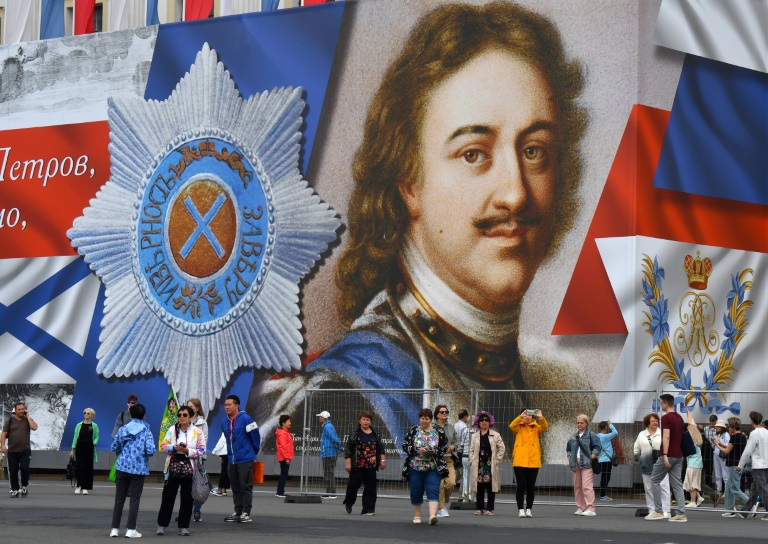Alexandra Kulikova often came across various European languages on the streets of St. Petersburg, the iconic city founded by Peter the Great as Russia’s “window to the West.”
“You could hear English, French, Italian everywhere – and the places were always full,” Kulikova, co-owner of a chain of rental apartments in the city, told AFP.
But the Kremlin’s military offensive into Ukraine and the resulting wave of sanctions have effectively closed Russia off to most Western travelers, severely damaging the country’s tourism industry.
Russia is now turning to tourists from Asia and the Middle East to fill the void.
“There are a lot of Chinese tour groups, Arab tourist families and Indians,” Kulikova said.
“But they’re staying in luxury hotels and not apartments, so they must be quite wealthy,” she added.
That’s putting pressure on her businesses, including a previously popular apartment building with breathtaking views of the city’s gold-domed St. Isaac’s Cathedral in the center of the city.
– “Reorganization” –
In addition to an increasingly hostile and unwelcoming political climate towards the West and Westerners, sanctions and logistical difficulties further complicate travel.
Direct flights to and from the European Union, the UK and the US have been suspended.
Additionally, Visa and Mastercard bank cards cannot be used in Russia.
All this has combined to cause a “reorganization of tourism towards the East,” said Sergey Kalinin, head of the St. Petersburg Association of Interpreters and Guides.
Nearly half of all foreign tourists who visited Russia in the first quarter of 2024 came from China – 99,000 out of an estimated 218,000.
According to the Russian Association of Tour Operators, the number of tourists from Germany was around 8,400, the highest among Western countries, but was two-thirds lower than in 2019.
– ‘We have a lot in common’ –
The transformation of this former imperial capital, known for its magnificent palaces and picturesque canals, has been remarkable.
On a long summer night at St. Petersburg train station, a group of mostly Chinese tourists rushed to catch an overnight train to Moscow.
“Russia is an interesting country. It’s easier to enter now, there’s an e-visa,” Liu Yiting, 60, told AFP as she waited to board.
“Russia has many tourist destinations and the two countries have a lot in common,” Itin added.
China has become Russia’s most important political and economic ally amid its offensive in Ukraine, and the two leaders, President Vladimir Putin and President Xi Jinping, frequently embrace each other as “old friends” on the international stage.
Western governments have strongly advised their citizens not to travel to Russia, but Beijing has issued no such warning, leading to a surge in Chinese tourists to Russia.
“There are a lot of Chinese who want to visit Moscow,” said Xia Kosinai, a young Chinese guide who had come to Moscow from Shanghai to guide a group of about 20 people.
“They only know Russia from television,” she told AFP.
“They are a bit scared because of the fighting in Ukraine, but once they reach Russia everything will be fine,” she said.
– “Not very optimistic” –
As Western countries become isolated, Russian authorities are seeking to expand travel opportunities for citizens of so-called “friendly” countries.
The Russian Economy Ministry said Moscow was exploring visa-free travel with Middle Eastern and Southeast Asian countries and wanted to increase direct flights to China and Iran.
St. Petersburg has also stepped up its own marketing.
City officials visited trade fairs in Beijing, Shanghai and Chengdu in May after inspecting a series of similar events in India.
The city said it hopes to visit 16 major trade fairs this year in Asia, the Middle East and former Soviet countries.
Despite all these efforts, many industry insiders say Russia still faces a severe tourist shortage.
“It’s not like it was before,” said Maria Khirkova, a tour guide in St. Petersburg.
“Even though there are Chinese (tourists), there is no big tourist influx and it’s nothing compared to pre-COVID,” she said.
Instead, the city has become heavily reliant on domestic tourists.
Of the roughly 9 million people expected to visit St. Petersburg in 2023, only 6% will be foreigners.
Before the pandemic, that figure was half.
“I’m not very optimistic,” Kirkova said.
“It will take at least five years for everything to recover.”
Bar/SPB/DL

